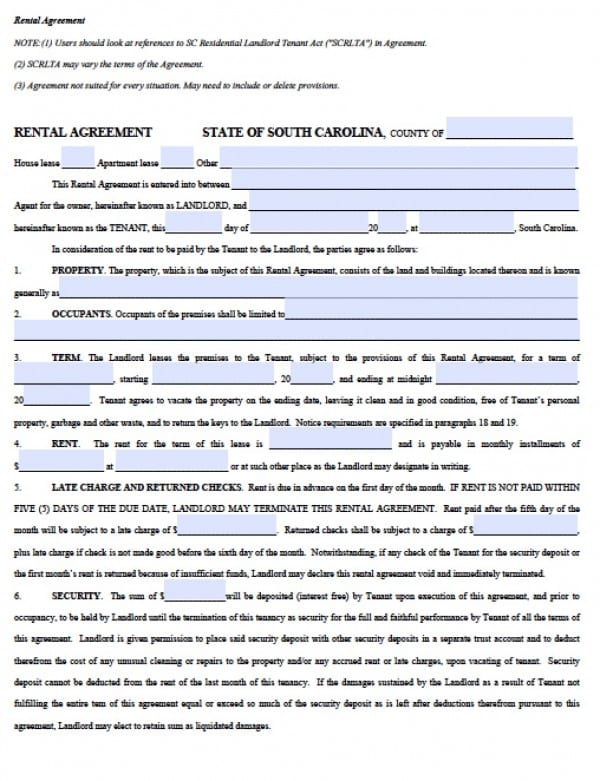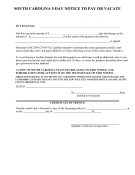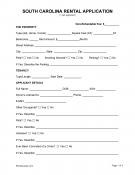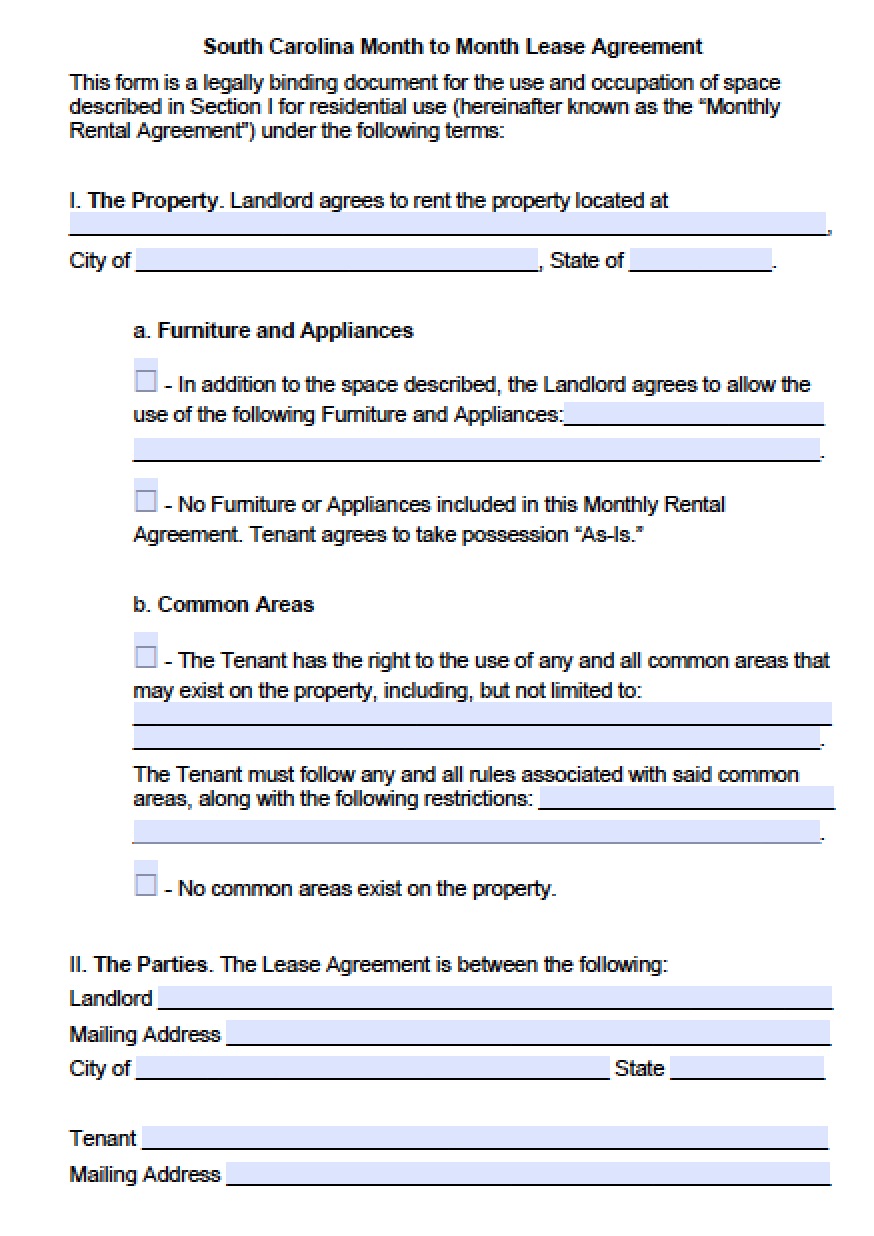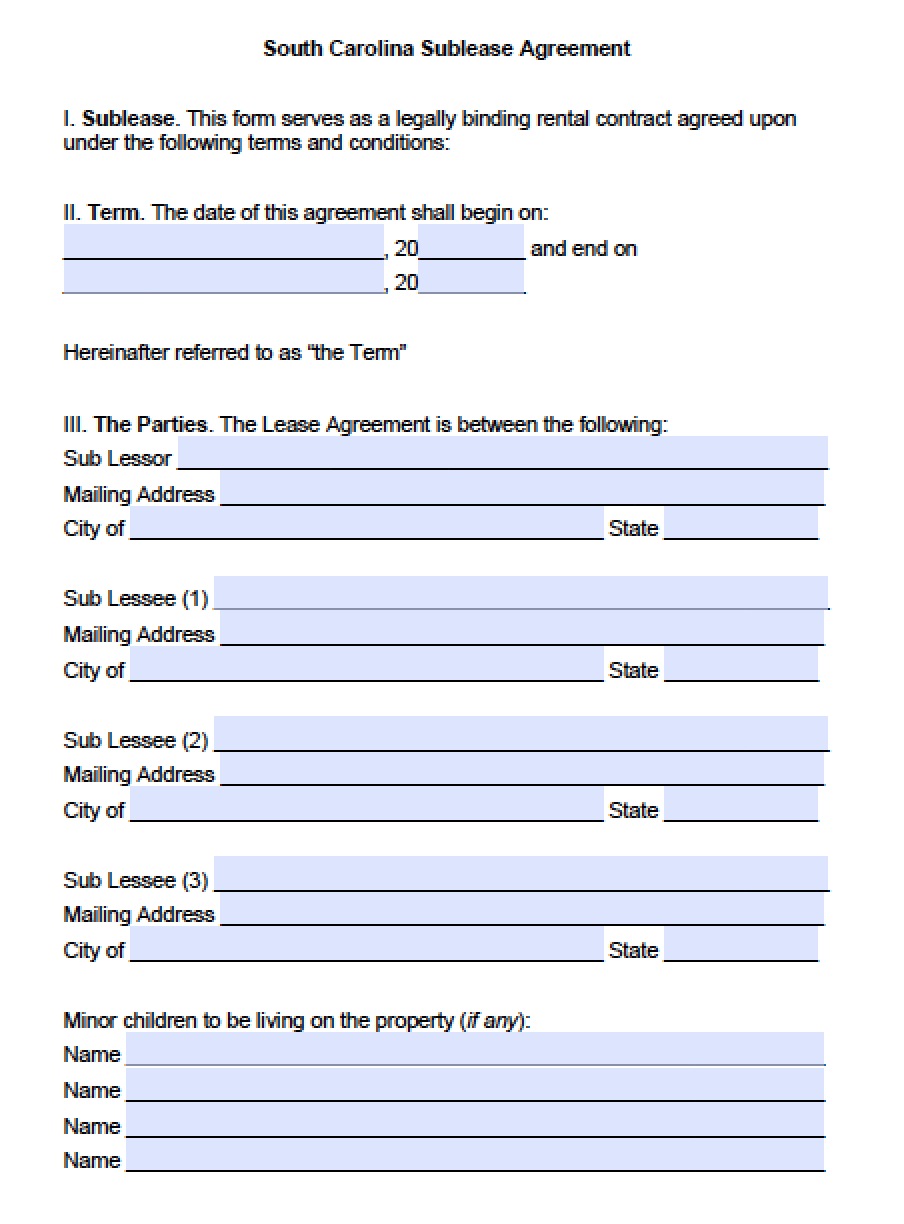The South Carolina commercial and residential lease agreements are contracts designed to establish a rental arrangement between a property owner/manager and a tenant. Whether the purpose of renting a particular property is for a livable or business space, the landlord should check the background of the prospective tenant to make sure they are a suitable candidate. All terms must be in accordance with State laws (Title 36, Chapter 2A (Commercial Code) and Title 27, Chapter 40 (Residential Landlord and Tenant Act) and, after completing and authorizing the form, the document becomes legal and binding until the end of the term. If a landlord or tenant would like to cancel the arrangement, they will have to both come to an agreement over the termination.
South Carolina Rental Lease Agreement Templates | PDF
South Carolina Lease Agreements
The South Carolina standard residential lease agreement sets forth the terms and conditions of a rental arrangement, specifically the renting of residential property to a tenant. These terms may be negotiated between the tenant and landlord but when the lease has been signed, both parties must adhere to them or face monetary or legal penalties. Before a residential lease is signed, the landlord will most likely want to have the tenant complete a rental application form. This ensures the landlord that…
The South Carolina five (5) day notice to quit is a form served upon a tenant if they fail to pay rent in accordance with their rental agreement. The document gives the tenant five (5) full days from the date of being served to pay all that is owed to the landlord or vacate the premises. If the amount is paid, the lease can continue. Failure to adhere to the demand will result in the immediate termination of the lease and…
A South Carolina rental application is a document used by landlords to help them make a decision regarding a prospective tenant of a residential property they are renting out. Among other things, the applicant’s credit score and financial situation will be verified and their background will be checked (employment, rental, and criminal). Above all, the landlord will want to make sure that the individual will be able to afford the monthly rent payments. If the landlord believes that the person…
A South Carolina commercial lease agreement is a binding contract between a business, represented by an entity or individual, and a landlord that owns non-residential space such as retail, office, or industrial. The form may be set up in three (3) different ways; Gross – The tenant pays a monthly amount and the landlord takes care of all utilities and expenses related to the property. Modified-Gross – Tenant and landlord negotiate and share all the costs associated with the premises….
The South Carolina month-to-month rental agreement permits a tenant to occupy a particular residential property, with no specific termination date, for a monthly fee. The agreement runs on perpetually until one of the parties, landlord or tenant, gives the other a written declaration of their intentions to cancel the agreement. A month-to-month lease should be treated the same as a standard residential rental agreement. The landlord should check the prospective tenant’s credit and background through a rental application form. Furthermore,…
The South Carolina sublease agreement is a document used by a tenant (currently renting a property for a landlord) who wishes to rent all or a part of their rental space to another individual. This process is called subleasing and it requires that the landlord agrees to this situation. The original tenant, called a “sublessor,” accepts the responsibility of having a sublessee rent the property. This means that the sublessor could be liable for any issues caused by the sublessee,…
STATE DISCLOSURES
Identification (§ 27-40-420) – Any person authorized to act on behalf of the landlord must be identified in the lease agreement as well as anyone allowed on to the premises. In addition, a legal address must be given to the tenant for official notices.
Security Deposits (§ 27-40-410) – This disclosure regarding security deposits only pertains to landlords that have more than five (5) adjoining units on the property and charges different deposit amounts to different tenants. If this is the case, the landlord needs to create a document and hang in a conspicuous place in order to explain why lessees were charged different amounts.
Lead-Based Paint – Due to Federal law, any property that was built before the year 1978 must be outfitted with this disclosure to all tenants identifying the probability of this type of hazardous paint existing on the premises.
SECURITY DEPOSITS
Maximum – There is no maximum security deposit amount that a landlord may demand from a tenant.
Returning (§ 27-40-410) – Landlord must return deposit within thirty (30) days after the termination of the tenancy.
LANDLORD’S ACCESS/ENTRY
The landlord must always provide at least twenty-four (24) hours notice before entering the property for non-emergency use. This may be for common or routine maintenance or to show the property to another prospective tenant at the end of the term (§ 27-40-530).

